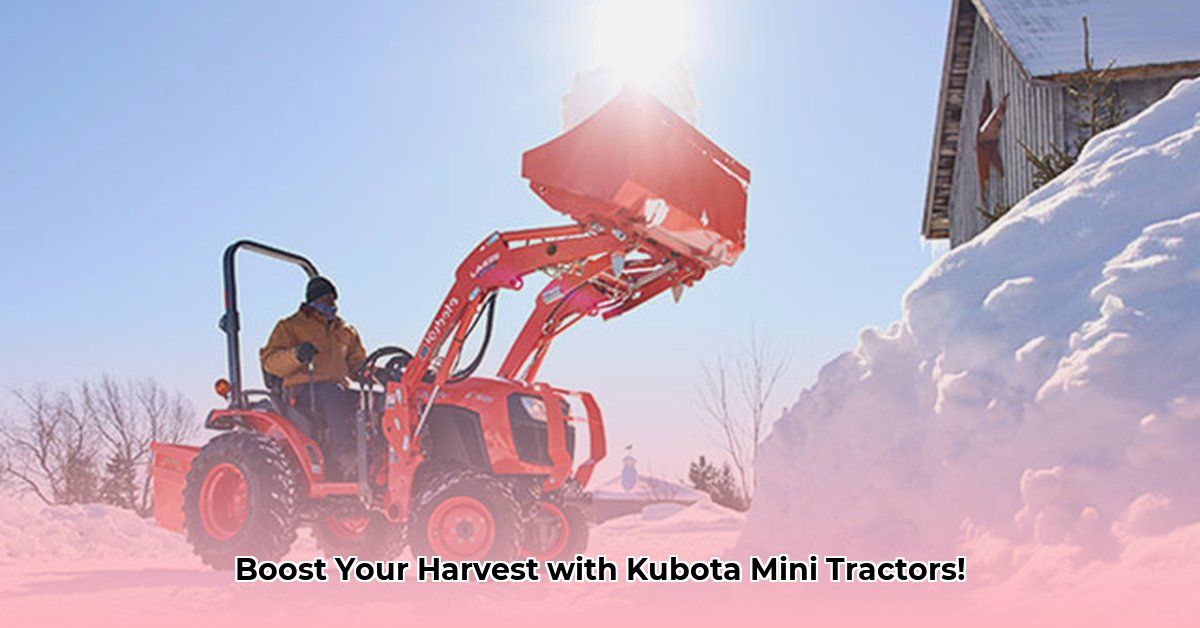
Sustainable agriculture demands innovative solutions, and Kubota mini tractors are emerging as a key tool for environmentally conscious farmers. Their compact size, fuel efficiency, and adaptability make them ideal for diverse farming practices, contributing to higher yields while minimizing environmental impact. This guide provides actionable insights, technical details, and future trends to help you leverage the power of Kubota mini tractors for a truly sustainable farm. For more information on Kubota's diverse range of equipment, visit the Kubota website.
Choosing the Right Kubota Mini Tractor: A Step-by-Step Guide
Selecting the optimal Kubota mini tractor requires careful consideration of your specific farming needs. This process can be broken down into several key steps:
Step 1: Assess Your Farm's Landscape and Operations. Begin by thoroughly evaluating your farm's unique characteristics. Is your land primarily flat, hilly, or a combination of both? How tight are your crop rows? What types of crops do you cultivate? The tractor's size, maneuverability, and horsepower will directly impact your operational efficiency and the overall success of your sustainable farming endeavor. A smaller, more agile tractor excels in confined spaces, whereas a slightly larger model may be necessary for sloping terrains.
Step 2: Define Your Farming Practices and Implement Needs. The choice of implements is critical. Will you use a tiller, mower, sprayer, or other specialized attachments? The tractor's horsepower (the rate at which it can perform work) and the availability of compatible attachments are crucial factors. For example, fruit orchards often necessitate tractors with specialized attachments for careful navigation between trees. This careful selection helps ensures efficiency and minimizes damage.
Step 3: Factor in Long-Term Costs and Reliability. Don't focus solely on the upfront cost. Factor in long-term maintenance expenses, parts availability, and the tractor's overall lifespan. Research the reputation and reliability of different Kubota models; some are known for their exceptional longevity, while others might require more frequent servicing. Regular maintenance is crucial for achieving optimal efficiency, and planning for these costs is key to long-term profitability.
Step 4: Budget Wisely and Explore Financing Options. Develop a realistic budget that accounts for the initial purchase price, fuel costs, regular servicing, and potential repairs. Many Kubota dealers offer attractive financing plans that can make owning a mini tractor more accessible, significantly easing the financial burden of an investment that's built for the long haul. Consider this as an investment in the increased efficiency and sustainability of your farming operation.
Kubota Mini Tractors and Sustainable Farming Practices
Kubota mini tractors are instrumental in implementing various sustainable farming practices:
Crop Rotation: Their maneuverability simplifies crop rotation, improving soil health and mitigating pest and disease issues. This essential technique for promoting sustainable agriculture is made easier by a machine that can efficiently navigate various fields.
Cover Cropping: Cover crops protect the soil, preventing erosion and bolstering fertility. Kubota mini tractors greatly facilitate the planting and maintenance of these crops, contributing to healthier soil and increased yields in subsequent years. This practice is vital for environmental sustainability.
Reduced Tillage: Minimizing soil disturbance through reduced- or no-till farming maintains soil structure, reduces erosion, and improves water retention – all crucial elements of ecologically friendly agriculture. These tractors are perfectly adapted to this style of farming.
Integrated Pest Management (IPM): By combining your tractor with precision application equipment, you can selectively apply pesticides only when and where required, minimizing environmental damage and enhancing ecosystem health. Careful and targeted application becomes significantly easier with the precise control of a Kubota mini tractor.
The Future of Sustainable Farming: Technology Integration
Sustainable agriculture is constantly evolving. We can anticipate further advancements in fuel-efficient engines, automation, and data integration within Kubota mini tractors and similar farming equipment. The integration of precision farming technologies, such as GPS guidance and variable-rate technology, will further boost efficiency and minimize environmental impacts. The future involves intelligent tractors that automatically adapt to varying soil conditions and weather patterns, maximizing yield and minimizing resource use. This represents a significant step in the evolution of sustainable agricultural practices.
Weighing the Pros and Cons: A Balanced Perspective
While Kubota mini tractors offer significant advantages for sustainable farming, it's crucial to acknowledge potential limitations:
| Advantages | Disadvantages |
|---|---|
| High Fuel Efficiency | Limited Lifting Capacity |
| Reduced Soil Compaction | Fewer Attachment Options than Larger Models |
| Excellent Maneuverability | Higher Initial Cost per Horsepower |
| Lower Environmental Impact | Requires Specific Training and Maintenance |
| Precision Farming Integration | May Not Suit Extremely Large-Scale Farms |
"The investment in a Kubota mini tractor is a strategic decision, contributing to both profitability and environmental stewardship," says Dr. Emily Carter, Agricultural Engineering Professor at Cornell University. "It's an investment in the long-term health and sustainability of your farm."
Actionable Steps: Purchasing Your Kubota Mini Tractor
Research: Thoroughly investigate Kubota mini tractor models (1), comparing specifications and reading user reviews. This thorough investigation is key to making an informed decision.
Assess Needs: Define your specific farming requirements and match them to the capabilities of different models.
Budget: Develop a detailed budget encompassing initial cost, maintenance, fuel, and financing options.
Test Drive: Obtain a test drive to assess the tractor's performance and suitability for your tasks. Hands-on experience is invaluable.
Dealer Selection: Choose a reputable Kubota dealer who can provide ongoing support and maintenance. Building a relationship with a reliable dealer is crucial.
Purchase: Once your research and testing are complete, make your purchase decision.